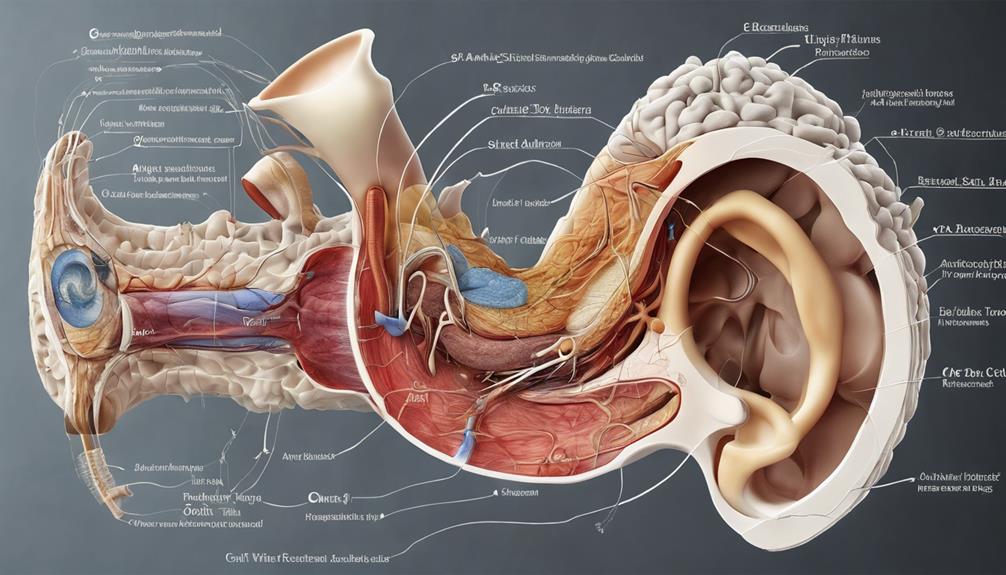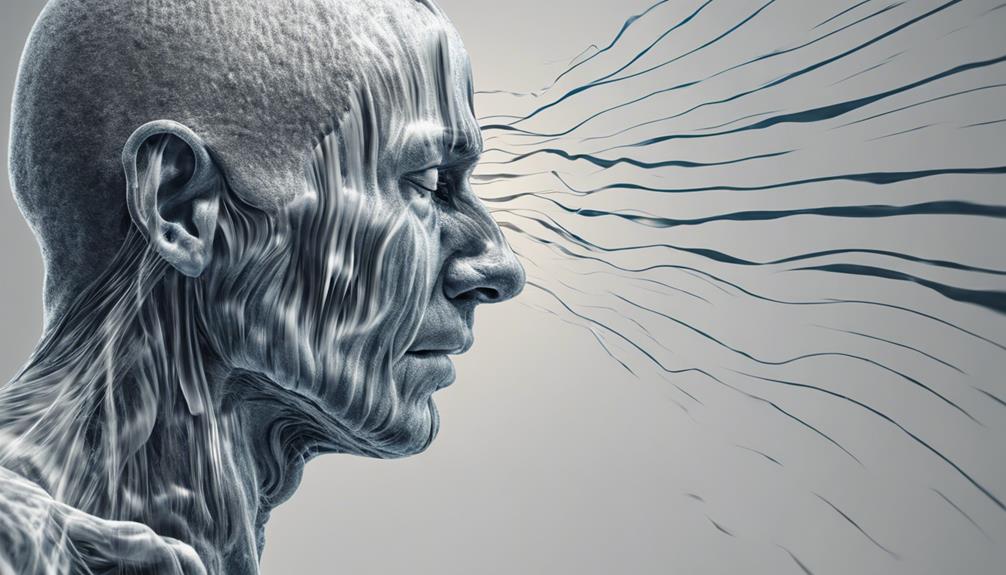Let’s explore the intricate relationship between trauma and hearing impairment.
An often overlooked aspect of traumatic experiences, the potential impact on our auditory abilities can be quite significant.
Understanding how trauma can affect our hearing is crucial, not only for recognizing the symptoms but also for exploring effective treatment options.
From unexpected causes to the intricate workings of our auditory system, the connections between trauma and hearing loss are worth exploring further.
Key Takeaways
- Trauma disrupts auditory pathways, leading to hearing loss and dizziness.
- Psychological distress from trauma can manifest as hearing issues.
- Various types of trauma, including head injuries, can result in hearing loss.
- Treatment involves hearing aids, cochlear implants, and addressing psychological impacts.
Trauma's Impact on Auditory Function
Indisputably, trauma exerts a profound impact on auditory function, disrupting the intricate pathway from the outer ear to the auditory cortex and manifesting as hearing loss and dizziness.
One of the key areas affected by trauma is the inner ear, where delicate structures are vulnerable to damage from head injuries. Even mild concussions can lead to changes in the auditory pathway or direct harm to the inner ear, potentially resulting in various causes of hearing loss. For instance, trauma can cause ruptured eardrums or harm to the hair cells responsible for converting sound vibrations into electrical signals the brain can interpret.
Severe head trauma can extend its effects beyond the inner ear, disrupting brain regions crucial for auditory processing. Such disruptions can lead to difficulties in understanding speech, ringing in the ears (tinnitus), and different types of hearing loss post-trauma. Understanding these intricacies is vital in comprehending the multifaceted impact trauma can have on auditory function.
Psychological Effects of Trauma on Hearing

How do psychological effects of trauma influence hearing abilities?
Psychological effects of trauma can have a profound impact on an individual's hearing abilities. Here are three ways in which trauma can influence hearing:
- Emotional Distress: Trauma often leads to emotional distress such as anxiety, depression, and PTSD, which can manifest physically as hearing loss or heightened sensitivity to sound. The emotional strain from trauma can directly affect the auditory system, leading to changes in how sounds are perceived.
- Auditory Processing Difficulties: Symptoms of PTSD like hypervigilance and avoidance behaviors can contribute to difficulties in processing auditory information. This can result in challenges in understanding speech, distinguishing between sounds, or filtering out background noise.
- Auditory Hallucinations: In some cases, trauma survivors may experience auditory hallucinations or misinterpret sounds due to their psychological distress. These hallucinations can further exacerbate the already compromised hearing abilities caused by the trauma.
Understanding the psychological effects of trauma is crucial in addressing and managing the impact it can have on an individual's hearing.
Types of Trauma Leading to Hearing Loss
Various traumatic events can lead to hearing loss through a range of mechanisms affecting the ear's structures and auditory pathways. Head trauma, such as a strong impact on the head, can result in various hearing loss symptoms. Whiplash, for example, can lead to hearing loss due to damage to inner ear structures like nerves in the brainstem.
Exposure to loud noises above 80dB can cause hearing loss by damaging cochlear cells and membranes. Additionally, burns or frostbite near the ears can physically damage the ear structures and impair hearing. Ruptured eardrums, caused by trauma or other factors, can result in hearing loss based on the size of the hole.
Understanding the different types of trauma that can lead to hearing loss is crucial in diagnosing and treating individuals who've experienced such events. By identifying the specific mechanisms through which trauma can impact hearing, healthcare professionals can tailor their treatment approaches effectively.
Treatment Approaches for Trauma-Induced Hearing Loss

Treatment approaches for trauma-induced hearing loss encompass a range of interventions such as hearing aids, cochlear implants, and auditory rehabilitation programs.
When addressing trauma-induced hearing loss, it's crucial to consider the following:
- Hearing Aids: These devices can help individuals with trauma-induced hearing loss by amplifying sounds and improving overall auditory perception, especially in cases where there's mild to moderate inner ear damage.
- Cochlear Implants: In situations where severe inner ear damage is present, cochlear implants can be a viable option. These implants bypass damaged portions of the inner ear and directly stimulate the auditory nerve, providing a sense of sound to the individual.
- Auditory Rehabilitation Programs: These programs focus not only on improving hearing abilities but also on addressing the psychological impacts of trauma-induced hearing loss. They aim to enhance communication skills, boost confidence, and improve overall quality of life for individuals experiencing this type of hearing loss.
These approaches, often implemented under the guidance of audiologists and a multidisciplinary team, play a vital role in managing trauma-induced hearing loss effectively.
Prevention and Coping Strategies for Trauma-Related Auditory Impairments
To prevent trauma-related auditory impairments, utilizing protective gear like helmets or earplugs during high-risk activities is crucial for safeguarding hearing health. Head injuries can lead to inner ear damage, causing hearing loss or tinnitus. Regularly checking for signs of ear damage, such as ringing in the ears, post-trauma is essential to address issues promptly. Engaging in relaxation techniques and stress management can help cope with the emotional impact of trauma-related hearing loss.
Additionally, attending regular follow-up appointments with an audiologist to monitor and manage any changes in hearing post-trauma is recommended.
Educating yourself on the potential effects of trauma on hearing can help you better understand and advocate for your auditory health. By taking proactive measures, such as using protective gear and seeking professional help when needed, individuals can reduce the risk of developing trauma-related auditory impairments. Understanding both the physical and psychological impacts of hearing loss post-trauma is crucial for comprehensive care and management.
Frequently Asked Questions
How Can Trauma Cause Hearing Loss?
We know that trauma can cause hearing loss through damage to inner ear structures, like nerves or semicircular canals. Head injuries, like whiplash, can directly harm the auditory system, leading to difficulties in sound conduction. Ruptured eardrums from trauma can also affect hearing.
Additionally, traumatic brain injuries disrupt the auditory pathway, resulting in various types of hearing loss. Understanding these mechanisms helps us grasp the impact of trauma on hearing function.
Can Emotional Trauma Cause Ear Problems?
Yes, emotional trauma can indeed cause ear problems. The mind-body connection plays a significant role in how stress and anxiety from trauma can impact our ears. This can worsen existing conditions or even lead to new ones like tinnitus, hearing loss, or sound hypersensitivity.
Research suggests a link between mental health issues and ear troubles. Seeking therapy for trauma may help alleviate these symptoms by reducing stress levels.
Can Emotional Abuse Cause Hearing Loss?
Yes, emotional abuse can cause hearing loss.
The prolonged exposure to emotional abuse can lead to physical symptoms like headaches and migraines, which may impact hearing health.
The stress and anxiety resulting from emotional abuse can affect auditory processing and contribute to conditions like tinnitus.
Seeking therapy and support for emotional abuse is crucial to mitigate the potential impacts on hearing function.
What Kind of Head Trauma Can Cause Hearing Loss?
Head trauma, whether from falls, accidents, or sports injuries, can lead to hearing loss. Even mild head injuries can cause changes in the auditory system, impacting hearing.
Damage to the outer ear, middle ear, inner ear, or auditory cortex can occur with head trauma. Symptoms like dizziness, tinnitus, and difficulty understanding speech may signal ear damage from head trauma.
Monitoring these signs is crucial for early intervention and treatment.
Conclusion
As we've explored the intricate ways in which trauma can cause hearing loss, it's evident that the impact on auditory function is profound and multifaceted.
The psychological effects of trauma on hearing, coupled with the various types of traumas leading to auditory impairments, highlight the need for tailored treatment approaches and preventive measures.
The journey to understanding and addressing trauma-induced hearing loss is ongoing, with new insights and advancements on the horizon. Stay tuned for more updates on this critical topic.










